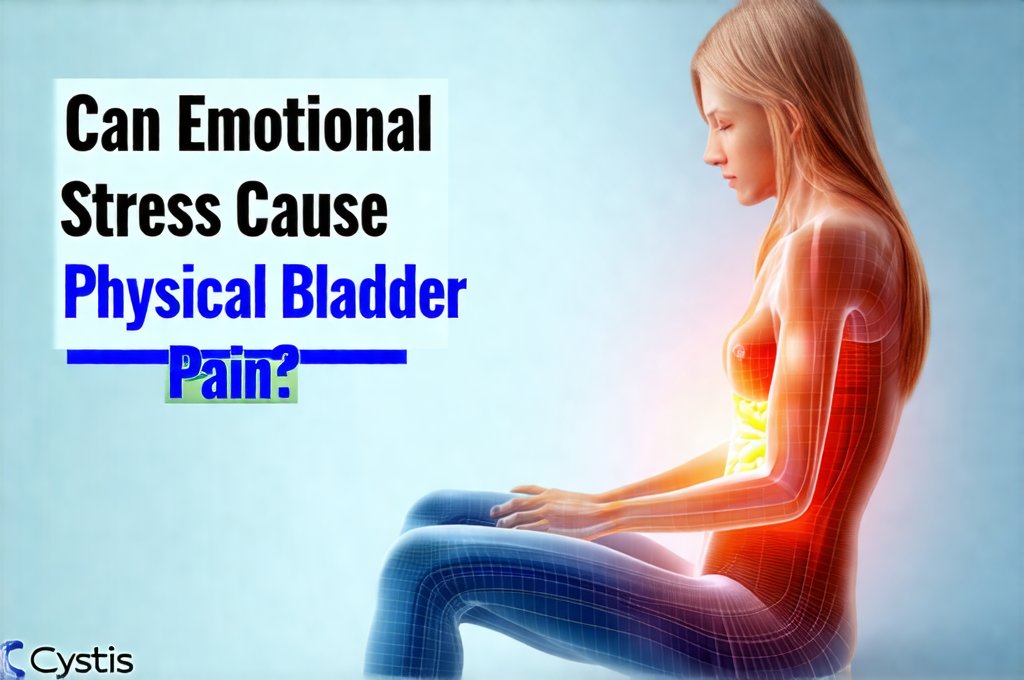Emotional stress is an inescapable part of life. From daily hassles like traffic jams and work deadlines to more significant events such as loss, trauma, or relationship difficulties, we all experience periods where our emotional well-being feels strained. While the connection between emotional state and physical health is widely acknowledged – often manifesting as headaches, digestive issues, or muscle tension – the intricate link between emotional stress and chronic pain conditions isn’t always understood. For many individuals suffering from persistent bladder pain, the question arises: could my emotional state be contributing to my discomfort? This article will delve into the complex relationship between emotional stress and physical bladder pain, exploring potential mechanisms, recognizing symptoms, and outlining strategies for managing both aspects of this challenging condition.
The body-mind connection is far more robust than previously thought. It’s not simply a matter of “thinking yourself sick”; it’s about how chronic stress alters physiological processes that can directly impact pain perception and exacerbate underlying conditions. The nervous system, endocrine system (hormones), and immune system are all interconnected and highly responsive to emotional states. Prolonged periods of stress can lead to dysregulation within these systems, creating a fertile ground for the development or worsening of various physical symptoms, including those related to bladder function. Understanding this interplay is crucial for developing a holistic approach to pain management that addresses both the physical and emotional components.
The Stress-Bladder Pain Connection: A Deep Dive
The relationship between stress and bladder pain isn’t straightforward; it’s often bidirectional, meaning each can influence the other. Chronic stress can contribute to several factors that exacerbate bladder discomfort. Firstly, it triggers the release of cortisol, the body’s primary stress hormone. While cortisol is essential for short-term survival, chronically elevated levels can disrupt immune function, increase inflammation throughout the body, and heighten sensitivity to pain signals. This heightened sensitivity means even normal stimuli might be perceived as painful, or existing pain feels more intense. Secondly, stress often leads to muscle tension – particularly in the pelvic floor muscles. Tightness in these muscles can restrict bladder capacity, irritate surrounding nerves, and contribute to feelings of pressure or discomfort. Finally, emotional distress can alter how the brain processes pain signals, amplifying the perception of pain and reducing coping mechanisms.
It’s important to note that this isn’t about “imagining” the pain; it’s about a genuine physiological response to stress that intensifies existing sensations. For individuals with pre-existing conditions like Interstitial Cystitis (IC) or Pelvic Pain Syndrome, stress can act as a significant trigger, leading to flare-ups and increased symptoms. Conversely, chronic bladder pain itself can be incredibly stressful, creating a vicious cycle where pain leads to anxiety and depression, which then further exacerbates the pain. Breaking this cycle requires addressing both the physical and emotional components of the condition simultaneously. The gut-bladder connection is also worth mentioning – stress dramatically impacts gut health, which in turn influences inflammation levels throughout the body, potentially impacting bladder function too. If you’re experiencing frequent flare-ups, it may be helpful to understand can high stress cause UTI relapse in females?.
Recognizing the Signs: Symptoms to Watch For
Identifying whether your bladder pain is linked to emotional stress involves paying attention to patterns and associated symptoms. A key indicator is a noticeable correlation between periods of high stress or emotional distress and worsening bladder pain. This might involve flare-ups after particularly stressful events, such as work deadlines, family conflicts, or significant life changes. Beyond the direct bladder pain – which can manifest as urgency, frequency, pressure, burning sensations, or discomfort in the pelvic region – look for accompanying physical symptoms that often accompany stress. These include:
- Muscle tension (especially in the shoulders, neck, and jaw)
- Headaches
- Fatigue
- Digestive issues (like IBS symptoms)
- Sleep disturbances
- Increased heart rate or palpitations
Furthermore, pay attention to your emotional state. Are you experiencing increased anxiety, irritability, sadness, or feelings of hopelessness? These emotions are often indicative of underlying stress that could be contributing to your pain. Keeping a pain diary can be incredibly helpful in identifying these connections. Record not only the severity of your bladder pain but also your stress levels, mood, and any triggering events. This will help you – and your healthcare provider – understand the relationship between your emotional state and physical symptoms. It’s also vital to differentiate between acute flare-ups related to specific stressors and chronic, persistent pain that may require different treatment approaches. Understanding can emotional stress cause urinary urgency? can help you manage your symptoms more effectively.
The Role of Pelvic Floor Dysfunction
Pelvic floor dysfunction (PFD) is often a significant contributor to bladder pain, and stress can play a major role in its development and exacerbation. The pelvic floor muscles support the bladder, uterus (in women), and rectum. When these muscles become tight or dysfunctional due to stress, they can put pressure on the bladder, leading to increased urgency, frequency, and pain. Stress causes us to instinctively tighten these muscles – it’s a natural protective response. However, chronic tension prevents them from functioning properly, impacting bladder emptying and increasing nerve sensitivity in the area.
- Identifying PFD: Symptoms of PFD include difficulty relaxing the pelvic floor muscles, pain during sexual activity or bowel movements, and a feeling of incomplete bladder emptying. A physical therapist specializing in pelvic health can perform an internal examination to assess muscle function and identify any imbalances.
- Treatment for PFD: Treatment typically involves pelvic floor muscle exercises (Kegels), but incorrectly performed Kegels can actually worsen the problem! It’s crucial to work with a qualified physical therapist who can teach you proper technique and develop a personalized exercise program. Other treatment options include biofeedback, myofascial release, and stress management techniques.
The Impact of Trauma and Adverse Childhood Experiences (ACEs)
Trauma, whether physical, emotional, or sexual, can have profound and lasting effects on both mental and physical health. Adverse Childhood Experiences (ACEs), such as abuse, neglect, or witnessing domestic violence, are particularly impactful. These experiences can alter the nervous system’s stress response, leading to increased sensitivity to pain and a higher risk of developing chronic pain conditions like bladder pain. Individuals with a history of trauma may be more likely to experience heightened anxiety, depression, and difficulty regulating emotions, all of which can contribute to flare-ups and worsen symptoms.
- Trauma-Informed Care: It’s essential to seek care from healthcare providers who are “trauma-informed,” meaning they understand the impact of trauma and create a safe and supportive environment for patients.
- Therapy: Psychotherapy, such as Cognitive Behavioral Therapy (CBT) or Eye Movement Desensitization and Reprocessing (EMDR), can be incredibly helpful in processing traumatic experiences and developing coping mechanisms. Addressing underlying trauma is often critical for long-term pain management. If you’re finding it hard to cope emotionally, consider if can UTIs cause emotional changes in women? might be contributing factors.
Strategies for Managing Stress and Bladder Pain
Managing the link between stress and bladder pain requires a multifaceted approach that addresses both physical and emotional well-being. Here are some strategies to consider:
- Stress Reduction Techniques: Incorporate relaxation techniques into your daily routine, such as deep breathing exercises, meditation, yoga, or mindfulness practices. Even 10-15 minutes of daily practice can significantly reduce stress levels.
- Regular Exercise: Physical activity releases endorphins, which have mood-boosting and pain-relieving effects. Choose activities you enjoy and aim for at least 30 minutes of moderate exercise most days of the week.
- Healthy Diet: A balanced diet rich in fruits, vegetables, and whole grains can support overall health and reduce inflammation. Limit processed foods, sugar, and caffeine, which can exacerbate bladder symptoms.
- Pelvic Floor Physical Therapy: As discussed earlier, working with a qualified pelvic floor physical therapist is crucial for addressing muscle dysfunction and improving bladder control.
- Psychotherapy: Consider seeking therapy to address underlying emotional issues, such as anxiety, depression, or trauma. CBT can be particularly helpful in developing coping mechanisms and changing negative thought patterns.
- Mindfulness-Based Pain Management (MBPM): MBPM combines mindfulness practices with cognitive behavioral techniques to help individuals manage chronic pain more effectively.
Ultimately, understanding the intricate connection between emotional stress and bladder pain is the first step toward effective management. By recognizing the signs, addressing underlying trauma, and incorporating stress reduction techniques into your daily life, you can take control of your health and improve your quality of life. Remember to work closely with a healthcare team that includes medical professionals, physical therapists, and mental health providers to develop a personalized treatment plan that addresses both the physical and emotional components of this challenging condition. If sleep is also an issue, it’s worth exploring can poor sleep cause bladder instability? as well.





















